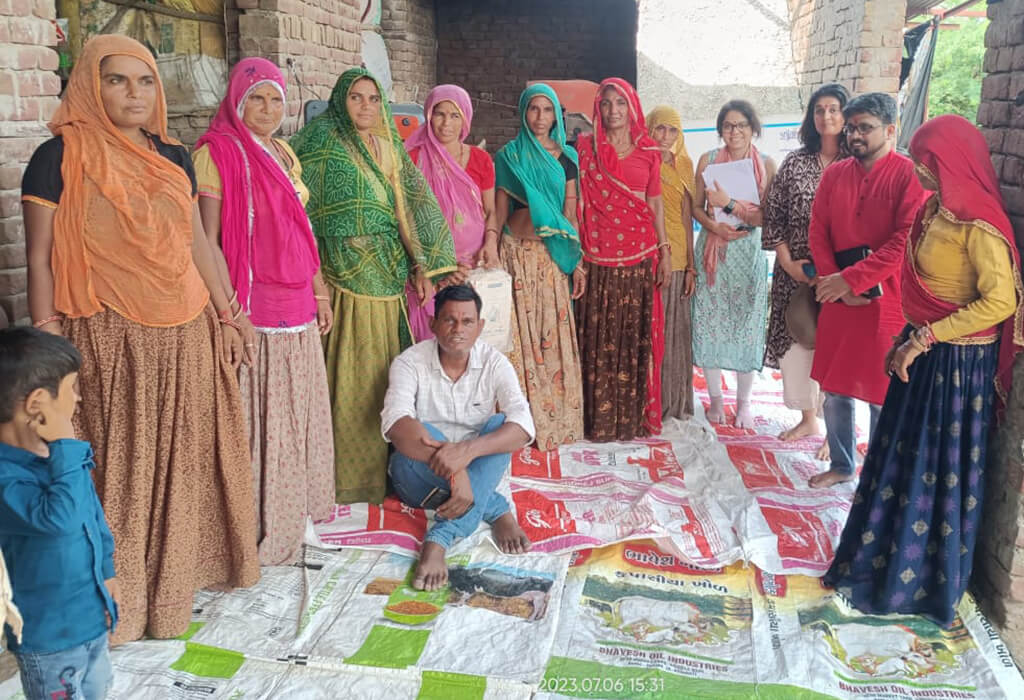"Women of the community have taken over financial planning for their families. From not knowing the household expenditures or banking systems, now women govern the usage of funds and discourage their husbands from engaging in wasteful expenditures, which has increased household savings."
The women of Dooni, in Rajasthan, India, have learned over the past 25 years how to build a better life for themselves and their families. This journey began when Self-Reliant Initiatives through Joint Action (SRIJAN) initiated a village women’s self-help group called Maitree Mahila Mandal Samiti, which has evolved into an independent farmer-producer organisation that supports the growth of local livestock rearing and other agricultural activities.
Once frowned upon for wanting to be financially independent, Maitree women have achieved this goal and more. They have earned new respect within their community, and more importantly, they now play a pivotal role in village decision-making.
 The women collectives SRIJAN has established help women build technical and soft skills which provide access to better livelihood opportunities.
The women collectives SRIJAN has established help women build technical and soft skills which provide access to better livelihood opportunities.
SRIJAN’s role in community-driven change
SRIJAN was founded in 1997 to make a difference in the lives of rural communities experiencing poverty through direct action in support of self-reliance. It believes in the power and capacity of community collectives to sustain development efforts.
Maitree is just one of the many all-women collectives SRIJAN has established in the villages of four states in India: Chhattisgarh, Madhya Pradesh, Rajasthan, and Uttar Pradesh. These collectives help women build technical and soft skills which provide access to better livelihood opportunities.
From the start, SRIJAN has served as a bridge between government and research institutions to bring the best agricultural practices to women in rural areas, ultimately providing them with better livelihood opportunities.
Why SRIJAN adopted a community-driven change approach
When SRIJAN staff started working with women in Dooni in the early 2000s, they recognised that to make lasting change, the initiatives needed to be community-owned. “We have seen that once a community gets involved in decision-making and takes ownership, they are able to overcome any on-ground challenges,” says Rupendra Kumar Sharma, programme director for SRIJAN in Rajasthan.
SRIJAN initially focused on bringing about a behavioural shift to increase women’s agency and sense of identity. During this early phase, SRIJAN provided the Maitree self-help group with 100 percent of the necessary capital along with skills training to rear livestock, improve farming practices, and instil financial discipline. Today, Maitree no longer needs SRIJAN’s financial support but continues to rely on it for advice. Meanwhile, Maitree remains firmly committed to achieving financial independence for each of its members. “When we started, each woman would contribute only Rs10 [$0.12] to the group savings. Today, my group of nine women stands at roughly Rs6 lakhs [$7,200] in savings,” says a participant.
Facilitating a shared vision and collective ownership
To financially empower women, SRIJAN works to inspire them to believe in their abilities as entrepreneurs. The women come together around a shared aspiration to establish an identity independent of their domestic roles. This also challenges patriarchal norms for women, like staying at home versus getting an education.
SRIJAN has focused on strengthening knowledge and leadership among women collective members by training them on best practices in agriculture and livestock rearing. This has proved to be financially rewarding and has enabled women to save. Overall, they now are less financially dependent on their husbands and have a renewed sense of purpose and confidence.
Strengthening the community’s leadership and asset base
SRIJAN’s training programs in livelihoods and money management have helped Maitree create a strong leadership bench. “None of us owned livestock or knew much about it. Today the community women are consulted for their professional knowledge,” says one woman. Other villagers now seek Maitree members' help to treat sick livestock, a service they provide at a fraction of the cost of a veterinarian.
Additionally, Maitree members independently deal and negotiate with suppliers to get fair prices for their agricultural produce. “The members take home Rs50–60 thousand monthly [$600–$720], which is as much as a skilled teacher earns in the village,” says one participant.
Focusing on equity
From the start, SRIJAN acknowledged the male-dominated nature of the Dooni community’s leadership structures and, as a result, took a gradual, long-term approach to build behavioural shifts to create acceptance for women in leadership roles.
Building on the trust developed within their community, Maitree women are now represented in decision-making bodies such as the gram panchayat, the basic governing institution at the village level. Maitree women also work closely with the panchayat to identify various issues confronting the community. The women strive to hold the gram panchayat accountable to ensure that government entitlements are accessible to the community’s most vulnerable. “In the village development plan [created by the panchayat], we now invite at least five women from each ward and take action on the issues they highlight on behalf of all women,” says the sarpanch who leads the gram panchayat.
Outcomes in communities
When SRIJAN’s work in Dooni began, staff had to go door-to-door to explain the concept of the village self-help group to the women of the community. Today, Maitree Mahila Mandal Samiti is a registered organisation officially recognised by government. It has its own Foreign Contribution Regulation Act registration, which enables it to receive foreign funding.
Until 2013, the Maitree collective received 100 percent of its funding from SRIJAN. Since 2020, it has been financially independent, with a corpus of Rs1 crore ($120,000) and a full-time staff of more than 20 women. The collective has been able to secure capital from private banks and grow its membership at a rate of almost 20 percent annually.

